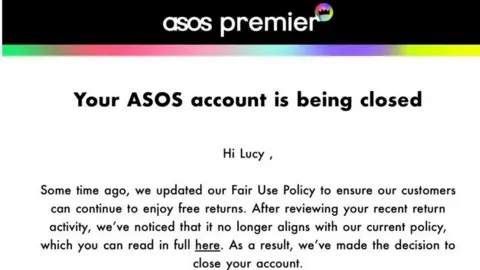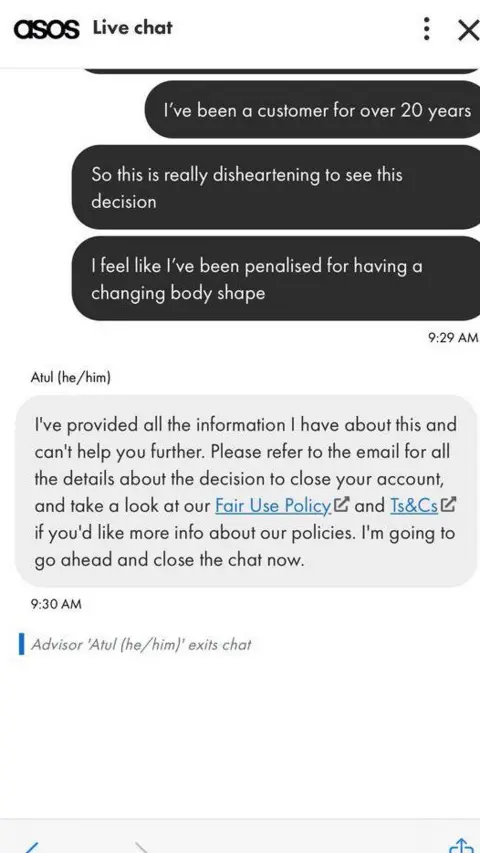‘A slap in the face’ – Asos bans shoppers for making too many returns
3 hours agoRuth Comerford & Grace DeanBBC News

 BBC
BBCAsos shoppers have expressed anger after their accounts were shut for returning too many orders.
Some customers have received emails in recent days informing them they are banned for allegedly breaching the online fashion giant’s fair use policy.
It comes after the company last year began charging a controversial £3.95 fee if customers make frequent returns and keep less than £40 worth of items in an order.
In a statement, Asos told the BBC: “We recently closed the accounts of a small group of customers whose shopping activity has consistently fallen outside our fair use policy.
“This helps us maintain our commitment to offering free returns to all customers across all core markets.”
Asos’ fair use policy says that it may shut down accounts that have “unusual or suspicious activity”, which it says includes “unusual patterns of returns activity” and items being returned that look worn.
The retailer first warned customers in 2019 that it might deactivate accounts displaying such patterns, but customers say a tougher crackdown has begun in the last week.
Lucy Britnell, a self-confessed “shopaholic” from Teesside, has paid for a premier Asos account since 2018, which gives customers free delivery – but has now been banned.


“I probably spend at least £100 a month with Asos – my latest holiday shop [over several orders] was £500,” she says.
“Most of the time I have to order two sizes and then I’ll return the one that doesn’t fit – and Asos sizing, especially its own brands, is very unpredictable.”
In an email on Thursday, Asos told Lucy: “After reviewing your recent return activity, we’ve noticed that it no longer aligns with our current policy.”
It said that it would close her account in 30 days and the ban would apply to any new accounts she opens.
The same day, she received an Instagram request from Asos, asking permission to repost onto its account a photo of an Asos outfit she was wearing.
“It was a real slap in the face – I thought it was a joke at first,” she says.
“Even if they did reinstate my account, I’d take my money elsewhere,” Lucy says. “It’s really left a bad taste in my mouth.”


Asos, which is based in the UK, says it shipped 67.2 million orders worldwide in the last financial year.
As well as its own lines, it sells hundreds of other brands, and its website offers everything from low-priced clothing and vintage fashion to Korean skincare and Sol de Janeiro.
Some customers have complained of being dismissed when trying to appeal their account bans.


Louise Gowrie, from Glasgow, says she was “cut off” when she tried to raise a complaint on the live chat feature of Asos’ website.
“I tried again and asked how to complain regarding this and they told me the decision was final – and cut me off again with no reasoning,” the 27-year-old tells the BBC.
Meanwhile Frankie Allen, 32, a PR director from London who has been an Asos customer for about 20 years, says she often orders clothes in two sizes and returns the one that doesn’t fit.
After being banned recently, she tried to explain this on the live chat but was told nothing could be done, screenshots seen by the BBC show.
Such “robotic comms” have changed the way people view the company and “alienated a lot of loyal customers,” Frankie claims.


But she says she still understands why Asos is cracking down on returns.
“I’ve received ripped jeans and clothes with make-up on them before from Asos, so I know there are some people who abuse the policy – like they wear the clothes once, keep the labels on, then return them for a refund,” she says.
It’s a view backed up by some industry insiders, who point out that shipping returned items back to warehouses, processing and inspecting them for damage all adds up. Inflation and freight issues have hit fashion companies hard too.
“Managing high volumes of returns simply isn’t a sustainable model,” retail expert Medi Parry-Williams says. “In many cases, a return fee of £3.95 doesn’t come close to covering these costs.”
That said, closing customers’ accounts is a “fairly severe line to take” and not one Asos would have taken lightly, says John Stevenson, retail analyst at Peel Hunt.
Following a boom in returns since Covid lockdowns, some retailers introduced charges to return items by post or collection, including Next, Zara, H&M, Uniqlo and New Look, though they still offer free returns in store.


Pretty Little Thing faced a backlash when it started deactivating accounts it said had high rates of return last year. The policy came in shortly after it introduced £1.99 fee for returns.
Asos did not respond to further requests for comment from the BBC about customers being banned. Some are now calling on the company to change course.
Broadcaster and consultant Tskenya-Sarah Frazer has launched an online petition after she was banned from the site, calling for a halt on “charging and punishing” customers for online returns.
“As a plus-size, tall, and neurodivergent individual, shopping online is my only option,” the 31-year-old tells the BBC.
“As the high street shrinks and we exist and have to shop more online, it is absolutely imperative that customers have the freedom to shop and return freely.”